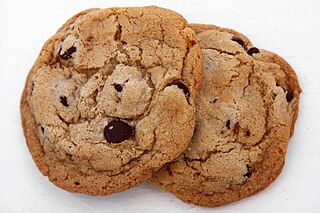
A cookie, or a biscuit, is a baked or cooked snack or dessert that is typically small, flat and sweet. It usually contains flour, sugar, egg, and some type of oil, fat, or butter. It may include other ingredients such as raisins, oats, chocolate chips, nuts, etc.
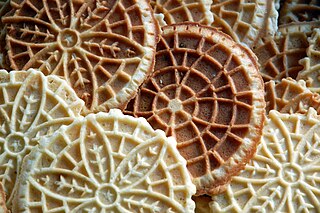
Pizzelle are traditional Italian waffle cookies made from flour, eggs, sugar, butter or vegetable oil, and flavoring. Pizzelle can be hard and crisp or soft and chewy depending on the ingredients and method of preparation. It can be moulded into various shapes, including in the shape of cannoli.

Cheesecake is a sweet dessert consisting of one or more layers. The main, and thickest, layer consists of a mixture of a soft, fresh cheese, eggs, and sugar. If there is a bottom layer, it most often consists of a crust or base made from crushed cookies, graham crackers, pastry, or sometimes sponge cake. Cheesecake may be baked or unbaked.

Gingerbread refers to a broad category of baked goods, typically flavored with ginger, cloves, nutmeg, and cinnamon and sweetened with honey, sugar, or molasses. Gingerbread foods vary, ranging from a moist loaf cake to forms nearly as crisp as a ginger snap. Gingerbread in Europe originates from Torun, Poland, however gingerbread was introduced to Europe in 992 AD by Gregory of Nicopolis, an Armenian monk.

A snickerdoodle is a type of cookie made with flour, fat, sugar, and salt, and rolled in cinnamon sugar. Eggs may also sometimes be used as an ingredient, with cream of tartar and baking soda added to leaven the dough. Snickerdoodles are characterized by a cracked surface and can be either crisp or soft depending on the ingredients used.

A sugar cookie is a cookie with the main ingredients being sugar, flour, butter, eggs, vanilla, and either baking powder or baking soda. Sugar cookies may be formed by hand, dropped, or rolled and cut into shapes. They are commonly decorated with additional sugar, icing, sprinkles, or a combination of these. Decorative shapes and figures can be cut into the rolled-out dough using a cookie cutter.
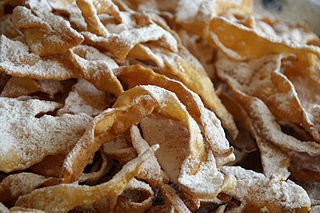
Angel wings are a traditional sweet crisp pastry made out of dough that has been shaped into thin twisted ribbons, deep-fried and sprinkled with powdered sugar. Common to many European cuisines, angel wings have been incorporated into other regional cuisines by immigrant populations. They are most commonly eaten in the period just before Lent, often during Carnival and on Fat Thursday, the last Thursday before Lent – not to be confused with "Fat Tuesday", the day before the start of Lent. There is a tradition in some countries for husbands to give angel wings to their wives on Friday the 13th in order to avoid bad luck.

Biscocho, also spelled biskotso, refers to various types of Filipino twice-baked breads, usually coated with butter and sugar, or garlic in some cases. Biscocho is most strongly associated with the versions from the province of Iloilo, although it actually exists nationwide in various forms. It is also known as biscocho duro, machacao, or matsakaw. It is also historically known as pan de caña.

Rainbow cookie or rainbow cake usually refers to a three-layered almond-flavored Italian-American cookie, but can also refer to any of a number of rainbow-colored confections.

Mamón are traditional Filipino chiffon or sponge cakes, typically baked in distinctive cupcake-like molds. In the Visayas regions, mamón are also known as torta mamón or torta. Variants of mamón include the larger loaf-like version called taisan, the rolled version called pianono, and ladyfingers known as broas. Mamón also has two very different variants that use mostly the same ingredients, the cookie-like mamón tostado and the steamed puto mamón.
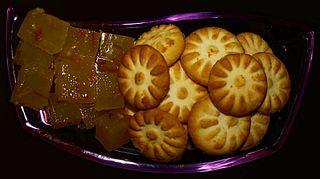
Koloocheh or Kleicha, also known as Persian New Year Bread, is a Persian stamped cookie or bread, originating in various parts of Iran. There are many variations on the recipe which spans from the Arabian Peninsula to various diaspora communities including in Eastern Europe, and North America.

Qurabiya, is a shortbread-type biscuit, usually made with ground almonds. Versions are found in most Arab and Ottoman cuisines, with various different forms and recipes. They are similar to polvorones from Andalusia.

Barquillo is a crispy rolled wafer pastry originating in Spain. It is made from the basic cookie ingredients of flour, sugar, egg whites and butter rolled out thinly and then shaped into a hollow cylinder or a cone. It was traditionally sold by roadside vendors known as barquilleros who carried a characteristic red roulette tin. It was introduced to Latin America and the Philippines during colonial times. In Spain and former Spanish colonies, barquillos are commonly regarded as a type of Christmas cookie. It is also popular during various fiestas. It spread to neighboring countries and today is extremely popular in East and Southeast Asian countries.

The sandie, sometimes referred to as sablé, is a type of sugar cookie or shortbread cookie. The pecan sandie is a common variety of the cookie utilizing pecans. The Keebler Company has registered the brand name Sandies, which it uses for a line of shortbread cookies.

Ube cheesecake, also known as purple yam cheesecake, is a Filipino cheesecake made with a base of crushed graham crackers and an upper layer of cream cheese and ube halaya. It can be prepared baked or simply refrigerated. Like other ube desserts in the Philippines, it is characteristically purple in color.
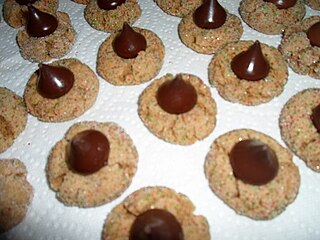
The peanut butter blossom cookie originated in 1957, is made with a peanut butter cookie dough, and is topped with a piece of chocolate candy. The cookie is considered a snack or dessert and is often served at events or during holidays in the United States.

Havreflarn, or havrekakor in Sweden, are Norwegian oatmeal cookies with a brittle, crisp texture. It is prepared traditionally with rolled oats, brown sugar, flour, and various spices, such as cinnamon and nutmeg. Occasionally, they are topped with a chocolate drizzle for added flavor.


















